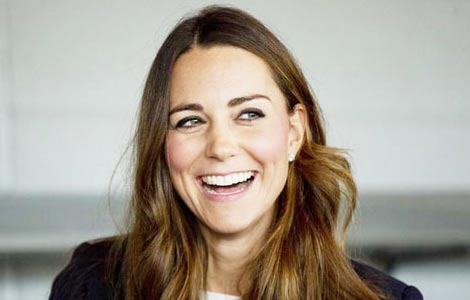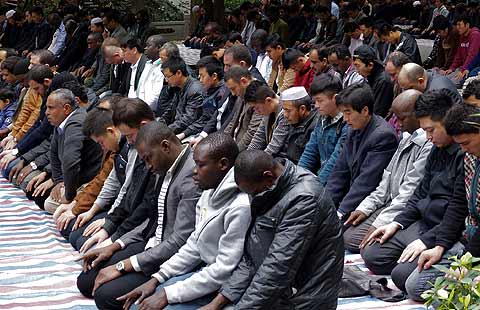Super sub achieving new goals
Updated: 2014-04-12 07:21
By Luis Liu (China Daily)
|
||||||||

Original 'Steel Rose' has thrived off the pitch but still has passion for game
Editor's note: Soccer is the world's No 1 sport, and China has its own aims for the game. President Xi Jinping has spoken about his soccer dream: China reaching the World Cup, China hosting the Cup and, ultimately, China winning the coveted trophy. However, the nation still lags far behind in the soccer world. The 2014 Brazil World Cup is just around the corner and we have selected 11 key figures from around the country to tell us about their soccer dreams. The interviews will be on RTHK Putonghua Channel at 4 pm on Sundays through June 8.
On July 28, 1996, China trailed Brazil by a goal late in the semifinal of the women's soccer tournament at the Atlanta Olympics.
|
Wei Haiying says the 1991 Chinese women's soccer team, of which she was a member, was better than later incarnations. Xinhua |
In the 65th minute, desperate head coach Ma Yuan'an turned to the bench and pointed at his No 7, and a 25-year-old pony-tailed forward stepped onto the pitch. Fifteen minutes later, she tied the game. Five minutes before time ran out, she coralled a loose ball, pivoted and beat a Brazilian defender's tackle before firing a shot into the top-left corner of the net.
China defeated Brazil 3-2 and advanced to the Olympic final.
The "savior" was right winger Wei Haiying. With her hands held high at the final whistle, that freeze-frame moment marked the peak of her career.
For many fans, it was their first introduction to Wei - but she soon achieved nationwide fame. During that golden era of Chinese women's soccer, fans remembered almost all the names and jersey numbers of the squad that became known as China's 'Steel Roses'.
"I am so grateful that many fans still remember my name after so many years," said Wei, now a soccer coach and district councilor in Hong Kong.
Born into a sporting family in Hainan province, Wei was destined to be an athlete. One of her older sisters played basketball while the other was a track and field athlete. By accident, she was picked for her middle school soccer team after a daily track and field training session. That's when the legend began and she got to witness the national team's halcyon period.
Wei played in two World Cups, one Olympics, two Asian Games and five Asian Cups.
In her heart, the 1991 Guangzhou World Cup team was the strongest, while the 1996 Atlanta experience was the saddest.
"The 1991 team was actually better than the later ones," Wei said. "We had a well-formed organization as each player had her own distinguishing style. Some were speedy, some had excellent skills and some had perfect agility. The coach could build a team with specific tactics so that we could be stronger than merely 11 individuals.
"We should have achieved better results, but we lacked experience and failed in some tiny but vital details."
For instance, Wei said there was no staff in place to take care of the players psychologically which, she thinks, was one of the reasons for the team's failure and especially that of the "nervous" girls.
"Nowadays psychologists work with the national team," Wei said.

"If only we had such support. Sport can be cruel. A loss is a loss. Track and field athletes can lose a race by 0.01 of a second, soccer is the same. All you can do is to lift your head up and keep going."
Many fans were disappointed when China finished fifth at the 1991 World Cup; especially after the host nation had trounced Norway, the eventual runner-up to the United States, 4-0 in the group stage.
"In the post-match meeting we huddled together and cried like hell," Wei said. "We really missed the chance to honor the nation in the first world event of women's soccer.
"We were devastated since we all thought it was our best chance. However, looking back, the failure proved to be a driving force.
"We would not have had the same desire over the following decade if we had won the title in the beginning."
Still, 1996 is the year that haunts Wei the most. She almost single-handedly pushed China through to the final and felt she was in the best form of her career. However, she only played 20 minutes in the final, which China lost to the US.
Eighteen years later, she is not afraid to speak out about the mistakes made by Ma, claiming China would have won the final if the coach had made the right moves.
Wei never previously criticized Ma because she was grateful for what he had done for the team - but in retrospect, she sees the shortcomings.
"If he knew the players' physical and psychological conditions better and if he was not so conservative in his tactics, China had a good chance to win the championship - and I would have more time on the pitch to help the team," Wei said.
For Chinese fans, the 1999 World Cup final against long-time rival the US was the high-water mark for the Steel Roses. But the team lost again, this time in the penalty shootout after battling to a 1-1 tie at the end of 120 minutes.
But Wei was not on that team. She retired at the age of 26 in 1997.
The main reason, she said, was her disappointment with the Chinese Football Association's attitude toward the women's national team.
Despite winning many titles, the side was not properly taken care of, Wei said.
"The CFA appeared indifferent to women's soccer. When we got good results the officials would come out and give us some empty promises. When we were not performing well they would stay away.
"All the girls had given all they had during the best years of their lives, but no one in the administration paid us the respect we thought we had earned and deserved."
The other reason was because of love.
Wei met her future husband during a friendly match with a Hong Kong police team.
He accidentally kicked the ball into Wei's face; not exactly the greatest start to a romance, but that's how their love story began.
In 2007, 10 years after moving to Hong Kong, Wei started to campaign for district councilor. She was encouraged by community and business figures who were impressed by her competitive spirit and outstanding communication skills.
The climb was steep. Wei faced a frustrating battle with a councilor who had 30 years of political experience, but her soccer memories kept her spirits up despite losing her first election.
"It is just like the World Cup (the Hong Kong district council elections are held every four years) - you might fail the first time but you have four years to prepare for the next," Wei said.
"I told myself that I wouldn't lose the next chance."
She then started to pay more visits to the community and canvas for votes. Four years later, she had earned the trust of the majority of voters and finally defeated her senior rival.
She said she is grateful for what soccer has taught her, and that she will never leave the sport.
"I know soccer is my destiny," Wei said. "I grew up with her, I found my love through her and I will continue to work for the good of the sport."
Wei's coaches part-time, while her husband is a professional coach in Hong Kong.
While she has been away from the national setup for years, Wei still pays attention to the team's development.
The side's current malaise concerns her and she said systematic problems have to be addressed by the authorities and a clear path for the future urgently outlined, "otherwise China won't have enough girls to play the sport, let alone good players".
Moreover, she expects more from the current crop of talent.
"The national team jersey is sacred, but I am sad to see some young players not giving their all," Wei said.
"Maybe because this generation has not gone through hardships in life ... not like us. But one should remember, soccer is about effort and hard work."
However, she remains somewhat optimistic about the future: "They need time to improve. I hope I can again see our national team step up on the podium."
Q&A
Some people say you were a magical 'super sub' as you always came off the bench and changed games. Why?
There is nothing magical in soccer. It is only a word used by the media and fans to describe their feelings. Having worked as a coach for several years, I think only when you get the most from a player can you create magic.
To be a world-class women's soccer coach you first have to be able to teach the players according to their aptitude, as different players have different personalities and skills. You have to accept their uniqueness and place them in the right places. Second, be broad-minded, don't let the small things in life affect your tactics and strategies. Third, understand women. Tactically, anyone can coach a women's soccer team, but you have to know the physical and psychological features of women are different from men.
During its golden era China only seemed to fear one team - the United States. True?
We often organized overseas training sessions and friendlies in the US at that time, during which we met many overseas Chinese, especially students. They treated us like family, welcomed us warmly in the hotel and even cooked Chinese food for us. As I talked to them, I found they were not really happy because they were looked down upon as foreigners in that country. We love China. As a player, our job is to give it all on the pitch to glorify the nation, especially when playing against the US and Japan. But maybe because we wanted to win too much and were often too hard on ourselves, we always performed worse than normal when facing the US. Looking back, I think it would be different if we had a therapist with the team.
Will you watch the Brazil World Cup during this busy time as you prepare for your next election?
Of course I will watch. It is a good chance to relax and enjoy soccer. I support Italy and hopefully they can be the champions!
luisliu@chinadailyhk.com
(China Daily 04/12/2014 page16)

 Gorgeous Liu Tao poses for COSMO magazine
Gorgeous Liu Tao poses for COSMO magazine
 Post-baby Duchess
Post-baby Duchess
 Victoria Beckham S/S 2014 presented during NYFW
Victoria Beckham S/S 2014 presented during NYFW
 'Despicable' minions upset Depp's 'Lone Ranger' at box office
'Despicable' minions upset Depp's 'Lone Ranger' at box office
 'Taken 2' grabs movie box office crown
'Taken 2' grabs movie box office crown
 Rihanna's 'Diamonds' tops UK pop chart
Rihanna's 'Diamonds' tops UK pop chart
 Fans get look at vintage Rolling Stones
Fans get look at vintage Rolling Stones
 Celebrities attend Power of Women event
Celebrities attend Power of Women event
Most Viewed
Editor's Picks

|

|

|

|

|

|
Today's Top News
China's financial reforms 'not tough one'
Boao Forum focuses on 'growth drivers' for Asia
Texas firm offers costly air purifier
NBA to play games in China
'Shared responsibility' emphasized
China's envoy: 'Yes, we can!'
Shanghai, HK unveil cross-border trading plan for stocks
Another possible signal heard in search
US Weekly

|

|








